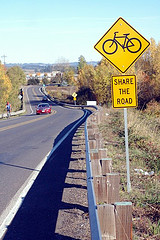Yesterday, the BTA’s Senate Bill 299 — which includes a provision about requiring a minimum three-foot passing distance — got its first debate on the floor of the Judiciary Committee in Salem.
A reporter from the Associated Press was there and filed a report that was picked up by the Oregonian.
The story includes many sides of the debate, starting off with comments of Jim Bombardier, a 58 year-old who was nailed by an SUV and is still in rehab six months later. He said:
“If it’s enforced and people take it conscientiously, it will save lives.”
Surprisingly, giving a buffer to bicycles is not a no-brainer to everyone. Here’s what Senator Jeff Kruse (R-Roseburg) thinks:
“This puts all the onus on the motor vehicle driver to make sure that the separation is there when there is nothing on the bicyclist…It’s totally one-sided.”
Also testifying at the hearing was lawyer Ray Thomas:
“I think for a lot of motorists, what they don’t understand is that being miserly with the distance is really dangerous.”
TriMet’s Mary Fetsch chimed in with a concern about downtown situations:
“Where we have some pause is in places like downtown Portland where the streets are very narrow.”
Senator Floyd Prozanski (D-Eugene) thinks three-feet might not be enough:
“If someone is sitting on a bike and they fell over sideways, when they fall, they’re going to fall further than three feet.”

A similar sentiment is shared by Ed Abrahamson, a transportation planner with Multnomah County. He says he’d rather not see any distance specified, because there are usually many factors involved in what is “safe”. He had his sign shop make a mock-up of a 4-foot passing distance sign.
Six other states — Arizona, Utah, Oklahoma, Minnesota, Wisconsin and Florida — and one municipality (Grants Pass, Oregon) already have a safe passing law on the books.
California — where cars are king — has tried and failed with a safe passing law in the past and is now trying again. According to a story in The Reporter newspaper in Sacramento, they’re facing a battle from the Teamsters, AAA and some Republican lawmakers.
They contend that if cars give room to bikes, the cars will run into oncoming traffic. Here’s what Republican Assemblyman Guy Houston says:
“I think you can make an argument that it would degrade safety for automobile drivers if you start going into ongoing traffic.”
It seems to me that the cars could/should just slow down, wait for five seconds, and then pass when it’s safe.
According to the Oregonian, an amended version of the BTA’s bill is expected to pass the Judiciary Committee. From there, it must still pass the House and Senate before being signed into law.


